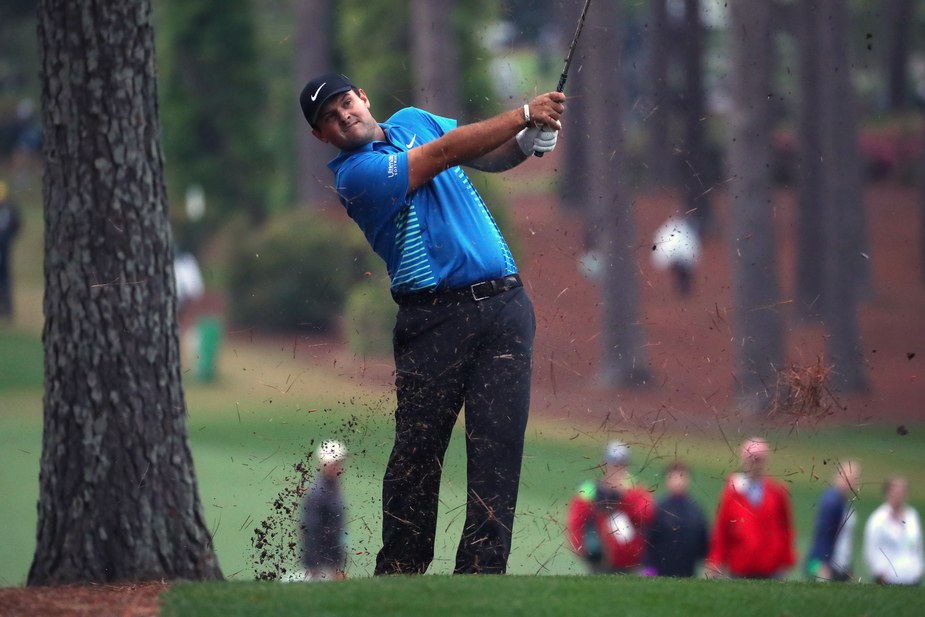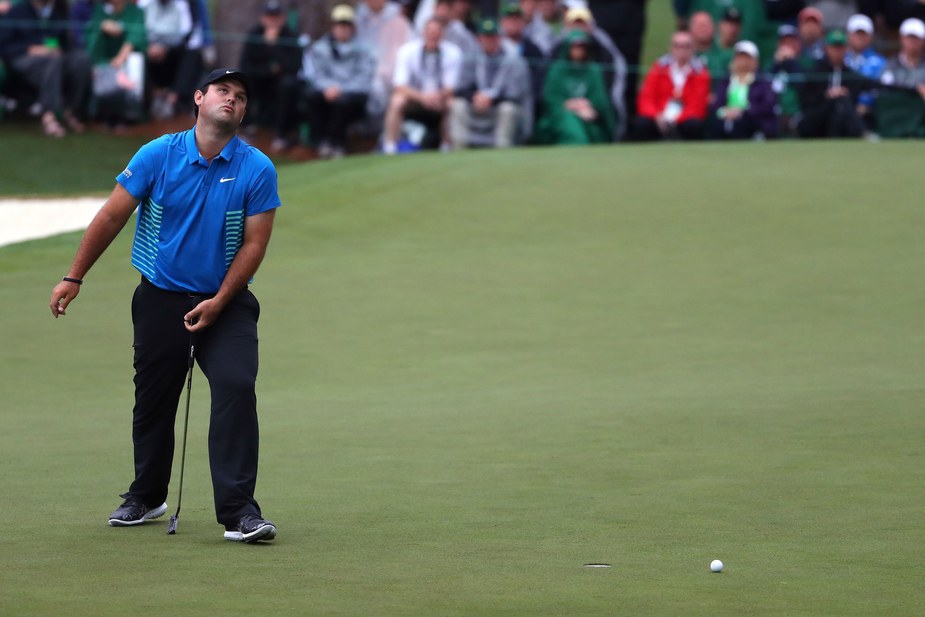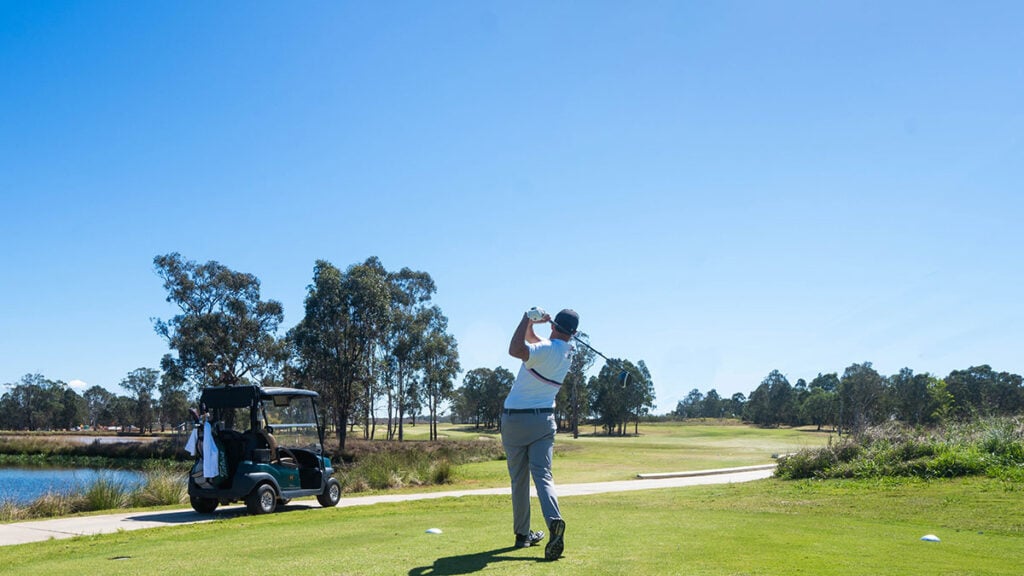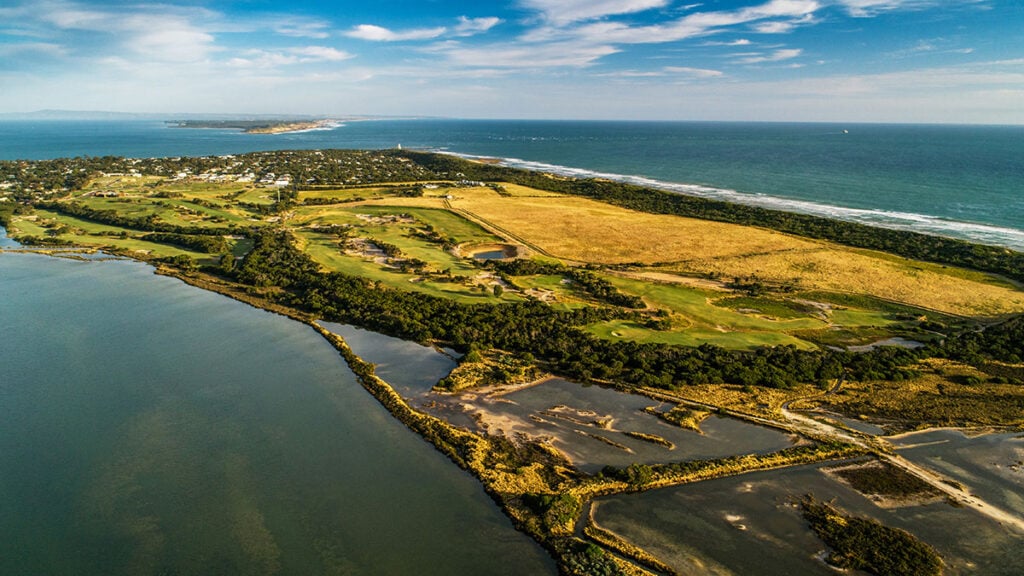There is something different about Patrick Reed at this 82nd Masters, more than just his impeccable putting and his implacable veneer. Somehow, he seems to have found a way to channel his conspicuous displays of patriotic fervour in team matchplay events – so overpowering that he sometimes appears on the precipice of rage – into his competitive arsenal when flying solo in strokeplay.
It’s not the easiest transformation, not when you can’t share your enthusiasm with your countrymen, who one week a year are happy that you bring your A-game along with your alpha-male attitude. But only for that one week.
Yes, Reed’s definitely different. And the leaderboard is the surest proof. Despite an array of notable challengers bleeding red numbers ahead of him, Reed on day three at Augusta National Golf Club was simply unflappable. With a five-under 67 under grey skies and intermittent showers, Reed increased his second-round lead by another stroke and will enter the final round with a three-stroke cushion and loads of confidence.
The fact that his nearest challenger is a surging Rory McIlroy, who is vying for the career Grand Slam, didn’t appear to phase the Texan, who with a 14-under 202 total will sleep on a 54-hole lead in a Major for the first time.

“I’m not out there to play Rory. I’m out there to play the golf course,” said Reed, 27, in trying to downplay the significance of being paired with McIlroy, his opponent in a raucous Ryder Cup singles match in 2016 at Hazeltine National in which Reed came out on top. “At the end of the day, if I go out and I feel pleased with how I play, then it should be an enjoyable Sunday night. But really, I’m just going to go out there and enjoy the day, play some golf and, hopefully, go out and shoot another round in the 60s.”
Were he to do that, the one-time star for the two-time NCAA champion Augusta University not only would threaten the tournament scoring record of 18-under, shared by Tiger Woods and Jordan Spieth, but he also would become the first player in Masters history to break 70 in all four rounds.
This from a player who in his previous four Masters starts produced a scant two rounds under par – none in the 60s. This from a five-time US PGA Tour winner who has mustered just one top-10 finish in a Major championship. But the how and when of that top-10 effort weighs greatly on these proceedings.
It was at the most recent Major contested, the US PGA Championship eight months ago at Quail Hollow Club in Charlotte, where Reed finally broke through, ending up tied for second just two shots behind champion Justin Thomas. At the time he believed it was a breakthrough that would propel him to more chances in Majors.
And here he is in the very next one, battering a stacked leaderboard with an all-around solid performance that has produced 18 birdies, two eagles both on the back nine in round three – and a helpless feeling for all but a few chasers. Just seven players are within eight shots of Reed, a margin that has significant historical context.
An eight-stroke deficit is the largest anyone has overcome in the Masters after 54 holes. And Jack Burke needed Ken Venturi to shoot 80 that final day in 1956 to win the green jacket.
Indeed, it is not unusual for a player to build on previous results. But the process seldom works so swiftly, especially for a guy who hasn’t won anything since 2016.
Clearly, it’s a fallacy that no one remembers who finishes second in a Major.

“I think the biggest thing was on one of the rounds when I played, I hit three total greens and only shot one-over par,” said Reed, referring to his second-round 73, which was two-over par at Quail Hollow. “To be able to feel like you played that poorly on ball-striking and salvage your round and then to be able to pull off a second-place finish at a Major, I felt like I left a lot out there and felt like I should have won the golf tournament.
“That just gave me the belief that, hey, you don’t need to put four perfect rounds together to win out here, especially at Majors. You can put four decent rounds, and if you are playing well, you have a good chance come Sunday. That was the biggest thing, just put in perspective, whether it’s a Major or whether it’s a regular tournament, you can go out there, and as long as you can manage your mistakes, you can still compete and win golf tournaments.”
It doesn’t hurt that Reed, ranked 24th in the world, leads the field in putting, always crucial at Augusta National. And it is of further comfort that he comes in posting top-10 finishes in his past three tour starts.
In just his 17th Major championship, Reed appears to have figured out quite a bit about how these things work. More importantly, he has figured out how he works and how to bring out his best when he plays for himself. He simply works up some Ryder Cup rage, if you will.
“It’s just kind of one of those things that I’ve been working on it and trying to tap into Ryder Cups more and more and try to play some solid golf,” he said, noting that when successful, he can kick his golf “into another gear”.
Which explains Reed’s reaction when McIlroy’s miracle chip-in eagle at the eighth hole pulled him into a tie atop the leaderboard. Reed responded with three straight birdies starting at the same hole and then made an eagle at 13 and chipped in for his second eagle at 15. “It’s just one of those things that I was able to get into that mode and get into that momentum and just try to keep going.”
He needs to keep it going for 18 more holes. Perhaps seeing Northern Ireland’s McIlroy beside him all day will perpetuate the feeling of intensity that serves him so well in team play, whether at Augusta University or in the Ryder Cup or Presidents Cup.
Reed always seems so eager to please others in that milieu. This time he can do something for himself. And by himself.




